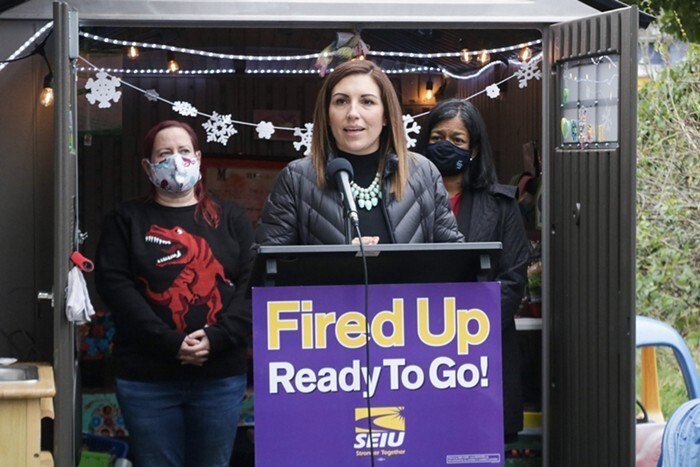On Monday afternoon, King County Executive Dow Constantine and Seattle Mayor Bruce Harrell announced that the two governments would open applications for a $7.4 million fund. A portion of the funding will go toward stabilization grants for Seattle child care providers and another portion to worker retention payments to give one-time bonuses to over 9,000 childcare workers. Money from the Best Starts for Kids levy and the JumpStart Payroll Expense Tax will pay for the program, which aims to keep workers from dropping out of the collapsing industry.
In a press release, Constantine and Harrell stressed the importance of childcare providers, especially over the last two-years during the pandemic. Harrell called the workers “heroes” in the community, though they’re not paid well for their services. They make about $9 an hour less than the median worker, according to the release.
The exact amount that will be distributed per provider and per employee will be calculated once all applications are received, according to the City. But the best the funding could do assuming all estimated eligible workers apply, would amount to an average one-time payment of just over $800. An $800 payment would make up for the $9-per-hour disparity between childcare workers and the median worker for about 90 hours of work, or a little more than two weeks of full-time employment. In Seattle, that wouldn’t cover half a month's rent for the average one-bedroom apartment.
Gabriela Quintana, a senior policy associate of family economic security at the Economic Opportunity Institute, called the one-time payments a “nice gesture,” similar to the City’s earlier $3 million in direct cash relief to childcare providers in the Seattle Rescue Plan, but she said it would not address the increasing fragility of this essential sector.
Only a wealthy few can afford the true cost of childcare, and the government only subsidizes the service for a small percentage of people on the other side of the spectrum. This policy choice leaves about half a million children without access to childcare in the state. Until the government starts to value childcare as a “common good,” Quintana said the inaccessibility will persist.
But you know what the government does value? Cops.
Just last month, the Seattle City Council voted to free up potentially millions in SPD’s salary savings for a new recruitment strategy to help the department achieve its goal of hiring 125 new officers. When former Mayor Jenny Durkan first started the hiring bonuses debate at the end of her term, she set the price at $10,000 for new hires and $25,000 for lateral hires. Respectively, that’s over 12 times and 31 times more than the average bonus payment the City and County will offer to childcare workers.
The council’s recently passed resolution did not include a specific dollar amount for the hiring bonuses because the bill’s sponsor, Councilmember Sara Nelson, didn’t “really care” what the cops used the money for. The council left the specifics up to the executive. The Mayor’s Office said that the Mayor is not ready to announce the plan, which “may or may not include hiring incentives.”
The council did, however, approve about $1 million from SPD’s salary savings to pay for relocation expenses for new hires, a national ad campaign, and a national search to hire a permanent Chief of Police.
Not everyone supported these expenses. The council’s most left-wing members– Councilmembers Teresa Mosqueda, Tammy Morales, and Kshama Sawant–all voted against the measures.
Mosqueda argued against allowing cops to use salary savings for recruitment because she thought that money could be better spent balancing the 2023 budget, which could see cuts of up to 6% for other important programs.
Ahead of the vote, Sawant reminded her colleagues that the City pays police officers better than almost any other entry-level job. Instead, she pushed the council to better fund salaries for underpaid workers who “actually turn people’s lives around” like social workers.
For Mosqueda, childcare is another important sector where the City needs to do “much more” to ensure workers get paid fairly and families get the care they need.
When the City appears willing to dole out much more to stabilize the police department than childcare workers, Quintana said, “It speaks to what we value as a society. We don’t value childcare workers in the same way as police officers.”




















